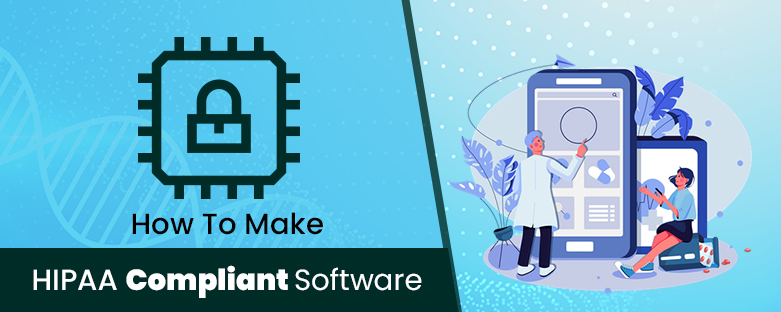How to make HIPAA Compliant Software?
Strict standards and limitations set by both state regulators and medical organizations must always be met while building software for the healthcare industry. In this article, we will concentrate on how to make HIPAA compliant software and how to comply with HIPAA by providing a proper IT solution for relevant institutions.
Organizations must include physical, administrative, and technological protections when designing a HIPAA security plan when developing HIPAA-compliant software. Organizations can use solutions such as Dash to construct security systems and easily manage public cloud HIPAA compliance.
The HIPAA is also known as Health Insurance Portability and Accountability Act is a federal statute that was developed without their knowledge or approval in order to protect the health records of the patient from being released. Physical, network, and process protection measures MUST be in place and strictly enforced by healthcare services that deal with protected health information (PHI) to ensure compliance with HIPAA.
What is HIPAA?
Each Healthcare software development company that works with PHI must do its best to protected organizations such as physicians or anybody who treats the patient, payments, and operations in the healthcare organization along with the related company who have access to patient records must do their utmost to ensure full PHI protection and enforce all practicable steps to meet HIPAA requirements. Not just this, all the vendors and subcontractors or company partners must also be in compliance.
The aim of HIPAA was to increase the accountability of health insurance coverage for workers between their jobs. The goal of the act was to minimize waste, corruption, and scams in the healthcare industry. It also encouraged medical savings and streamlined the administration of health insurance. The healthcare industry was urged by HIPAA to computerize patient records.
What is HIPAA Compliance Checklist?
Here are the critical features ensuring which will make sure your software is compliant with HIPAA guidelines.
- Ensure password-protected system access
- Access control to be maintained
- Authorization monitoring by admins
- Data backup to ensure retrieval
- Proactive remediation strategy should be ensured
- Emergency mode
- Automated log out if the system is not accessed for long
- Data storage with encryption and decryption
What are the requirements of HIPAA Compliance?
Any healthcare-related organization with access to a patient’s personal health information must ensure the administrative, technological, and physical security of the data. HIPAA has detailed requirements that address the standards for PHI protection to be followed. In the event of a breach, an investigation is carried out to ascertain the cause of the breach.
You need to satisfy four key criteria of the HIPAA law in order to meet requirements HIPAA compliance software:
- To secure patient health information (PHI), you must put protections in place. Administrative, technological, and physical maybe safeguards. The protections could be policies for workers who come into contact with PHI, encryption and decryption, audit controls, procedures for emergency access, and data security platforms.
- Have contracts with service providers that perform covered functions in place. These agreements, called Business Associate Agreements (BAAs), ensure that patient information is properly used, safeguarded, and disclosed by service providers (Business Associates).
- The use and distribution of confidential health information are fairly restricted to the minimum required to achieve your intended intent.
- Procedures to regulate who can access patient health information and how to secure patient health information training programs
How can you make HIPAA Compliant software?
You will have to make regular technical and non-technical reviews of your efforts to secure and properly record health information in order to be HIPAA compliant telehealth platform. A sample audit protocol has been released by the regulator that can help you determine compliance with your HIPAA.
If you wish to become HIPAA compliant, there are no shortcuts. Compliance with HIPAA means the implementing of controls and protections to ensure the confidentiality, integrity, and availability of protected health information and the creation of policies and procedures in accordance with the Healthcare Insurance Portability and Accountability Act (1996), the HIPAA Privacy Rule (2000), HIPAA Protection Rule (2003), the Economic and Clinical Health Information Technology.
You will need to review the full text of HIPAA (45 CFR Sections 160, 162, and 164), which has been condensed into 115 pages by the Department of Health and Human Services’ Office for Civil Rights, to become HIPAA compliant, and apply those rules to your own business.
In particular, given the nature of the punishments for HIPAA breaches and the repercussions of a breach of confidential health information or patient privacy, this can be a daunting prospect.
A HIPAA compliance checklist is a good starting point if your Software Development Company in the USA hopes to start offering products and services to the healthcare industry and you want to become HIPAA compliant. All provisions of the HIPAA Privacy, Protection, Omnibus, and Breach Notification Rules should be protected by the checklist. You need to carefully determine the protections, protocols, and procedures you need to follow with the use of a checklist.
It is highly recommended that you work with a third-party supplier of HIPAA enforcement solutions to help you comply with HIPAA and to ensure that your policies, processes, and activities comply with the rules of HIPAA. A third-party HIPAA compliance audit will ensure that you have established all HIPAA compliance necessary protections to ensure that any confidential health information you produce, store, hold, or distribute is properly guarded.
Last words…
VCDoctor is a HIPAA Compliant Software Development Company in USA who aims to help healthcare organizations to cope up with innovation in healthcare through specialized solutions and healthcare technology platforms. With front-line technology, topnotch service quality, we help healthcare providers to focus on delivering quality care rather than running an IT department.
That’s why we provide HIPAA-compliant Telemedicine App development services, EMR, EHR, Medical Billing, Health Information Exchange, Patient Data Management solutions, etc.





Thanks for sharing such kind of post on how to make HIPAA compliant software. It’s an informative and fantastic post that contains information in depth.
Great article on creating HIPAA-compliant software! Ensuring compliance is crucial for protecting patient information and maintaining trust.